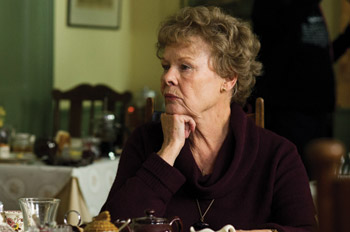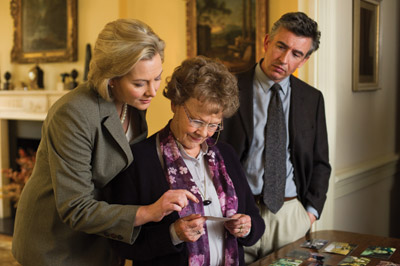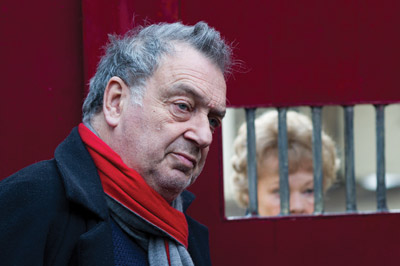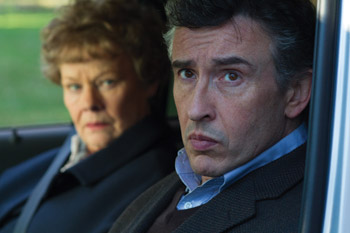Judi Dench Philomena

Philomena
Cast: Judi Dench, Steve Coogan
Director: Stephen Frears
Synopsis: Philomena is an emotional story inspired by true events, tinged with both tragedy and comedy, about two very different people who join forces for a remarkable journey. They are seeking to uncover the truth behind a heartbreaking story that has remained a mystery for half a century.
Philomena Lee, an Irishwoman in her 70s, became pregnant as a teenager in 1952. Her family abandoned her for shame and send her to a convent in Roscrea, Co. Tipperary, where along with other young girls in the same predicament she was regarded as -a fallen woman.' In compensation for the nuns taking her in and looking after her during childbirth she was made to work in the laundry there and only allowed access to her young son Anthony for an hour a day. When he was only three, Anthony was taken from the convent against her will; the nuns at Roscrea had agreed to sell him for adoption by an American family. Philomena spent the next 50 years trying in vain to establish his whereabouts.
Through a lucky set of circumstances she happened to meet Martin Sixsmith, an ex- BBC foreign correspondent and former director of communications for Tony Blair's government. When Philomena tells Martin about her long search for her son, he realises that hers is a remarkable story. He arranges for the two of them to visit the United States to and find out what happened to Anthony.
Philomena and Martin make an odd couple. She's a plain speaker and a trusting soul who takes people at face value and keeps her feet planted firmly on the ground. Despite all the injustices she has suffered, she still retains her religious faith. In contrast he is sophisticated, highly educated, a man at ease around important people and opulent locations; yet having lost his job in politics and been publicly humiliated, he's cynical and without religious conviction.
Together they embark on an extraordinary road trip. On the way they learn from each other, see a different point of view – and find reasons for laughter and joy in a quest that is often underpinned by sadness.
These two contrasting real-life characters, Philomena Lee and Martin Sixsmith, are played by two actors at the very summit of their respective fields: the legendary Oscar-winning actress Dame Judi Dench (Skyfall, The Best Exotic Marigold Hotel, Shakespeare in Love) and Steve Coogan (The Look of Love, 24 Hour Party People), one of Britain's leading comics and creator of the legendary TV and radio -personality' Alan Partridge.
Philomena
Release Date: December 26th, 2013
Playing An Odd Couple: Steve Coogan and Judi Dench
 'I'd worked with Billy Connolly on Mrs. Brown," Judi Dench recalls. 'And Steve Coogan and Billy Connolly are very alike in a way. They're both real comics, and they apply tremendous dedication to serious acting, something that isn't their form of work naturally. They're both very good at it. And then in between takes, of course, they make you cry with laughter.
'I'd worked with Billy Connolly on Mrs. Brown," Judi Dench recalls. 'And Steve Coogan and Billy Connolly are very alike in a way. They're both real comics, and they apply tremendous dedication to serious acting, something that isn't their form of work naturally. They're both very good at it. And then in between takes, of course, they make you cry with laughter.
'The more tense it is, the better it is. Perhaps if we'd been doing a comedy, we'd have cried between the takes. But Steve Coogan's such a brilliant mimic, and he'd be doing impersonations of celebrities in the car on the way to the set."
'Once we'd met and got to know each other, I was fine. But you do feel a bit nervous. This was Dame Judi Dench, after all. I'd seen her in Iris, and that role rather stuck in my mind: I hoped she'd like the fact that playing Philomena would be something different. It's a great part for an older actor – there's not that many. This is a fully rounded character."
Still, Steve Coogan admits that working with Dame Judi Dench he felt star-struck: 'There were one or two times when I took a picture of me and Judi Dench on set, and instantly emailed it to everyone I know." That feeling was mixed with a sense of intimidation: 'When she put the wig on, I thought: -I'd better pull my socks up. I'd better bring my -A' game, be as good as I can possibly be. Or I'll be dwarfed by her presence.'
'Yet on set I hardly ever saw her looking like Dame Judi Dench. She looked like Philomena. So in a sense, you go into a different world with her. And despite the fact we laughed a lot, at the end of the day it was all very workmanlike. Judi Dench's been doing this for 50 years. She asks the right questions and wants to do a good job. We were not doing a chat show and having a party: we were trying to do a scene and get it right."
Philomena: A Story Becomes A Film
Philomena Lee was already surprised that The Lost Child of Philomena Lee, Martin Sixsmith's book about her search for her son, made such an impression on readers. 'I couldn't believe the amount of letters Martin Sixsmith got after the book was published," she says now. But she was astonished when it became clear that Martin Sixsmith's book about her might be adapted for film.
Her daughter Jane Lee recalls: 'I got a phone call from Martin Sixsmith, and he said Steve Coogan was interested in making a film. I remember I thought: -Really? I didn't think he could play serious.'"
'When we met Steve Coogan at Martin Sixsmith's house he was so much a gentleman," Philomena Lee remembers. I didn't know much about him, I don't really follow comedians. In fact, I'd got him mixed up with Rob Brydon!
'They told me they wanted the book to be a film. My story! I didn't think it would ever come to fruition." Jane Lee adds: 'Mum has never thought hers was much of a story. To her, it's just her life."
'But Steve Coogan seemed genuinely touched by it," adds Philomena Lee. 'When we had a second meeting, it was dropped into the conversation that Judi Dench was interested in playing me. I was absolutely thrilled! I loved her in As Time Goes By, which I watched on TV all the time. So I couldn't believe it! I was so excited, and then so pleased to meet her finally. She's a lovely lady."
Jeff Pope, who was drafted in to work with Steve Coogan on the script, recalls: 'Basically, what we had was the story of an Irish lady searching for the son she'd given up to nuns 50 years ago. Given Steve Coogan's background, it's interesting that this was something that caught his imagination.
'Never at one point did we think: -let's write a funny line.' What we wanted was to play the emotion and the journalism of what happened. We knew that to explore the clash of cultures would be interesting.
'But the thing that really hooked me was Steve Coogan's idea: to put Martin Sixsmith in as a character. Martin Sixsmith hadn't written about himself in the book. So Steve Coogan's thought was: why don't we do a story about this middle-class, Oxbridge-educated, former government spin doctor and this simple little old Irish lady. Putting them together – that was where we began.
'Martin Sixsmith bought into it wholeheartedly. We also talked to Philomena Lee and said we wanted to make this the story of how the book came about. This has been an interesting journey for her. On what would have been her son's 50th birthday she blurted out to her daughter she'd had a son born 50 years ago, out of wedlock. She'd had to give him up and she'd been searching for him ever since.
 'I don't believe for one second she thought that journey would lead to this. She was raised a Catholic and she carries a lot of guilt about what happened in her life. She worries: -what will people think of me?' She didn't want to embarrass her family. But what I think we've managed to help Philomena Lee focus on is that there are still thousands of other people in the same situation. So if by talking about this, if one more mother and son are reunited as a result, then that's payment enough for her.
'I don't believe for one second she thought that journey would lead to this. She was raised a Catholic and she carries a lot of guilt about what happened in her life. She worries: -what will people think of me?' She didn't want to embarrass her family. But what I think we've managed to help Philomena Lee focus on is that there are still thousands of other people in the same situation. So if by talking about this, if one more mother and son are reunited as a result, then that's payment enough for her. 'Still, it doesn't come naturally to her. She's not effusive or outgoing. She's a private person."
Martin Sixsmith says of his book: 'Like so many good stories, it started out as a coincidence. I met someone at a party who said: -You're a journalist, aren't you?' and told me about Philomena Lee and her lost son.
'It was such a fantastic story I couldn't not write it. It's about love, loss, separation, yearning and ultimately about redemption. And in the film script it's also about how people learn from each other.
'I've done many things in life - worked for the government, worked for the BBC, been a historian. This was something I hadn't done before: it's a human interest story. And the more Philomena Lee and I worked together, the more I thought it was worthwhile. It was a detective story. We knew what had happened to her son – he as adopted, he went to America. But what was his life like?
'Philomena Lee was in two minds about me writing the book. She'd lived for 50 years with this onfeeling she had done something wrong, and so she shouldn't speak about it. But I'm a journalist. I'm not Irish, I'm not Catholic, so I was able to write the story a bit more dispassionately.
'But I also felt I needed to help Philomena. That was my first responsibility - and then to write the story for her."
For the film, it helped that Judi Dench came on board very early in the process. 'Steve Coogan got in touch with Tor Belfrage, my agent, and outlined the story to her," she recalls. 'Tor Belfrage rang me and told me about this extraordinary woman, still alive, who had met Martin Sixsmith and went on this quest to find out what happened to her son. Steve Coogan came down to see me, we sat in my garden, he read the script to me and I was completely hooked.
'I couldn't wait to get started. I was unbelievably impressed by the script. It was like a fictional story you might write -- but it happened to be true."
Still, there was one important decision to be made: who would direct the film. 'We thought about directors a lot," Gabrielle Tana recalls. 'Stephen Frears was always a dream, and Christine Langan (who had collaborated with Frears on The Queen) gave him the script. He was intrigued."
But Christine Frears took his time in deciding to commit to the project. 'He kept us waiting for a while," Gabrielle Tana says, 'though we told him Judi Dench would only be available until autumn 2012, but then she had to go off and do a play. So Stephen Frears worked on the script with Steve Coogan and Jeff Pope for three months, and finally said: -I'm in.'"
'I then approached Cameron McCracken at Pathe with a view to having them distribute the film. Cameron McCracken reacted immediately – he loved the script and the idea of working with Stephen Frears and Judi Dench again and gave an immediate commitment."
Stephen Frears describes Steve Coogan's commitment to the story as a leap of faith: 'Steve Coogan bought the book rights, and got Martin to sell them to him without actually reading it!" Yet Stephen Frears also admits: 'There was quite enough for me in this story to whet my appetite. It was always two things: the tragic story of this woman, with a sort of romantic comedy on top of it. So there's sadness and happiness at the same time. It's interesting that it manages to be both. The whole thing is a sort of balancing act."
Stephen Frears also relished the chance to work again with Judi Dench. This is the fourth film on which they have collaborated. Their first, a BBC TV play called Going Gently, goes back to 1981; he also directed her in Mrs. Henderson Presents. 'Judi Dench's absolutely wonderful, and I think she gives the best performance of her life in this," he says.
'And Steve Coogan plays it with depth and gets it right. It's an odd couple film, so you need someone as odd and eccentric as Steve Coogan. He's interesting and clever, with tremendous moral intelligence. It intrigues me, the way he got hold of this story and tweaked it in a way so it's also a reflection of his own lapsed Catholicism."
Stephen Frears also got to meet Philomena Lee, and recounts that she visited the set one day when scenes in the convent laundry were being shot: 'I told her, you shouldn't be here. You must have spent all your life trying to get away from this place." He describes Philomena as 'magnificent. You have no sense of this tragedy in her life. She has no self-pity. She doesn't carry around a scar. She's terrific - a very straightforward person. Judi Dench's character in the film is a woman who has retained her faith - and so has Philomena."
Judi Dench reports that she felt a sense of responsibility in playing Philomena: 'In a way it was like playing Iris (Murdoch), and Elizabeth I. But when someone's actually alive, it's even more of a responsibility. You want to be true to the story. It must be very disconcerting to see somebody playing you.
We had a (cast and crew) party where they showed us bits of the film, all put together, and Philomena was sitting behind me with her hand on my shoulder. I was terribly conscious of this person sitting behind me and seeing that – and our responsibility to her."
Stephen Frears shared her sense of responsibility about portraying real-life people, especially Philomena. 'But her own character is so splendid," he notes. 'She sets a good example. And it seemed to me if Judi Dench was playing her she was in good hands." Jeff Pope notes: 'The most interesting thing about this film is that it's about life. We want audiences to be shocked by what happens, and if this prompts mothers and sons from that era to come together, great. But really it's about the triumph of the human spirit. Philomena has come through this ordeal, but there's love in her heart still."
Most of Philomena was shot during an eight-week period at the end of 2012, near London, in the United States and in northern Ireland. Producer Tracey Seaward refers to it now as 'a relatively straightforward production," but as she also explains, it could equally have been chaotic from the outset.
'We were set to start shooting on a Thursday in early November in Washington DC, and our production designer Alan Macdonald and I flew out the previous weekend," she recalls. 'Stephen Frears was already in New York.
'But when we arrived in Washington, Hurricane Sandy was announced as due the following day. We managed to get Stephen Frears out of New York on the Monday, just before Sandy hit. It was quite unnerving, because we had Steve Coogan, Judi Dench and our cinematographer Robbie Ryan still in Britain. We thought at one point there was no chance we'd be able to start shooting on schedule but we managed through the brilliance of our travel company to get them out of London on the evening before we started shooting.
Cast and crew were only in Washington for a brief period: 'Our schedule was quite tight so working back from Judi Dench's end date, we couldn't afford to delay our start."
The main reason the unit was specifically in Washington was because the script called for a scene at the capital city's Lincoln Memorial. 'It was cold and it was complicated, because of the restrictions on shooting there," Tracey Seaward recalls. 'You can't have more than five people in chamber, including your crew. And you're not supposed to record sound in the chamber." She felt the production was fortunate in the support it received from Robin Owen of the U.S. National Parks Service: 'She was fantastic and helped us enormously."
After seven days in D.C., shooting was complete and the crew prepared to leave town. But the plane they took back to Britain developed a fault and they needed to return to Washington, before finally making it back on another flight.
On returning, the production then moved immediately for four days of shooting in County Down, northern Ireland, near the town of Rostrevor and around Killyleagh.
This section of the shoot was particularly meaningful for Judi Dench, who, though born in Yorkshire, is of Irish ancestry. 'All my relatives are from Dublin or the west of Ireland," she says. On arriving in Rostrevor she was told she had relatives in the town.
'Suddenly, at the end of one of our shooting days, here come two cousins a few times removed, Henry Kavanagh and his daughter Mary. They just turned up on set. It was lovely, a real bonus."
Because of her Irish roots, Philomena's accent was no problem for Dame Judi Dench: 'My mother was from Dublin, and I could hear my mother saying quite a lot of Philomena's lines very clearly. Also I have this wonderful friend Annie Hoey, who has been my dresser for 40 years. She's from Dublin too. So the accent's quite familiar!"
Then came another problem. The unit attempted to leave northern Ireland, but their plane was cancelled, so it was necessary to charter a plane to return to London. 'You can do a movie shoot all over the world and never have one delayed plane, but we were riddled with problems," Tracey Seaward says. 'It was quite interesting, moving this unit around!"
They finally made it and began shooting near London in mid-November. 'Then it was a straightforward shoot, actually," says Tracey Seaward. 'To be honest, everything seemed comparatively straightforward, because I'd produced the opening ceremony of the Olympics earlier in the year, which was very complex. So I was rather excited when we had a problem!
'A lot of this team have worked on quite a few movies together now. We think of them as Stephen Frears's UK family. So we all have an established working practice, though it was the first time we'd worked with Robbie Ryan, the cinematographer, who's an amazing addition to the family."
 She added that the issue of getting permissions to shoot at specific sites was sometimes delicate: 'We knew there might be some elements of the church that might be concerned about us filming on their property.
She added that the issue of getting permissions to shoot at specific sites was sometimes delicate: 'We knew there might be some elements of the church that might be concerned about us filming on their property. 'This happened when we made The Queen. A number of people were slightly fearful of allowing us to film on private property. They didn't know how we were going to portray Queen Elizabeth: were we making a movie that might somehow dishonour the royal household? As it turned out, I'm sure a lot of people who were worried about us shooting on their property would have been delighted had we filmed. Still, we had to tread carefully."
For the production team, one of the challenges was to find locations that could be used as the Roscrea convent in both the 1950s and 2000s. Says Tracey: 'We ended up with a composite of a couple of locations - Harefield House (which is almost 20 miles north-west of London), and Sherborne Castle, Oxfordshire. Ivan Gascoyne, our special effects supervisor, worked on making all that believable.
'But mostly, Philomena is a movie that's performance-driven. Everything else is there to facilitate that."
Philomena
Release Date: December 26th, 2013
MORE
- Mission: Impossible Fallout
- Glenn Close The Wife
- Allison Chhorn Stanley's Mouth Interview
- Benicio Del Toro Sicario: Day of the Soldado
- Dame Judi Dench Tea With The Dames
- Sandra Bullock Ocean's 8
- Chris Pratt Jurassic World: Fallen Kingdom
- Claudia Sangiorgi Dalimore and Michelle Grace...
- Rachel McAdams Disobedience Interview
- Sebastián Lelio and Alessandro Nivola...
- Perri Cummings Trench Interview



